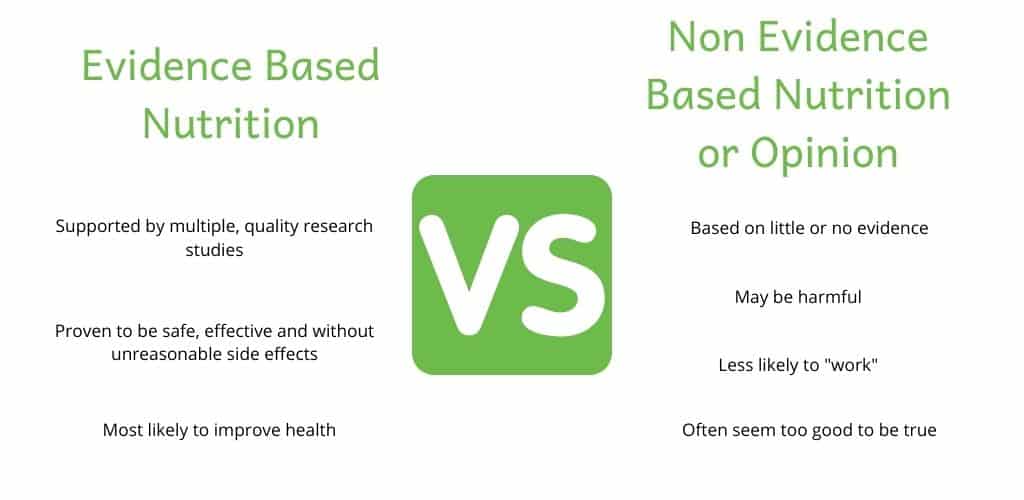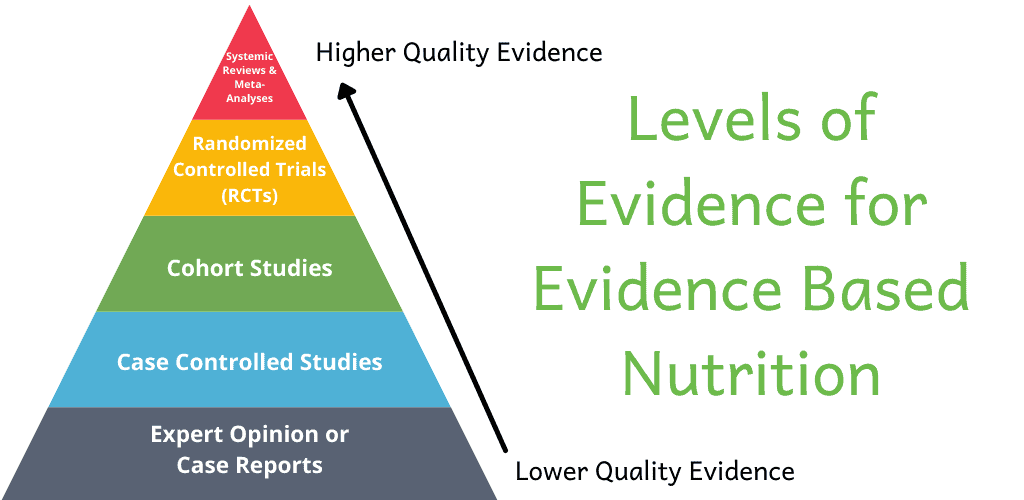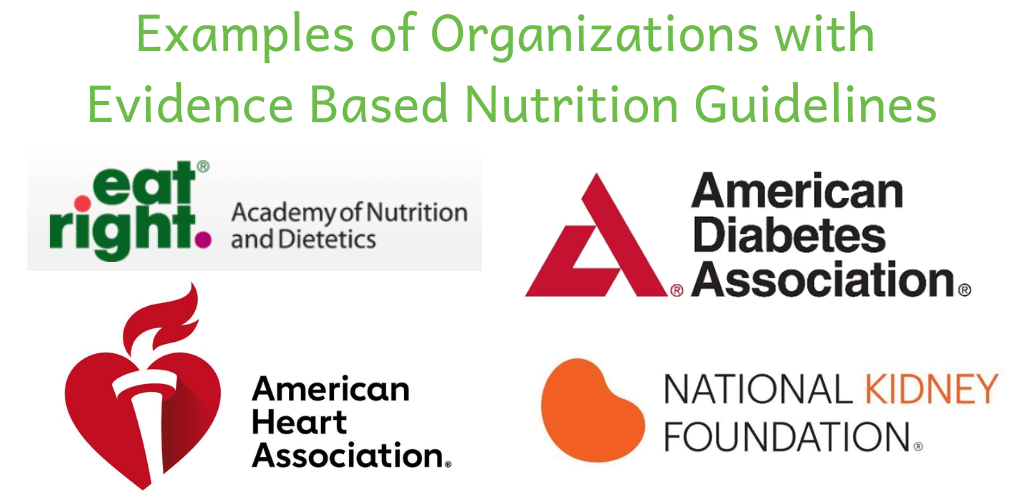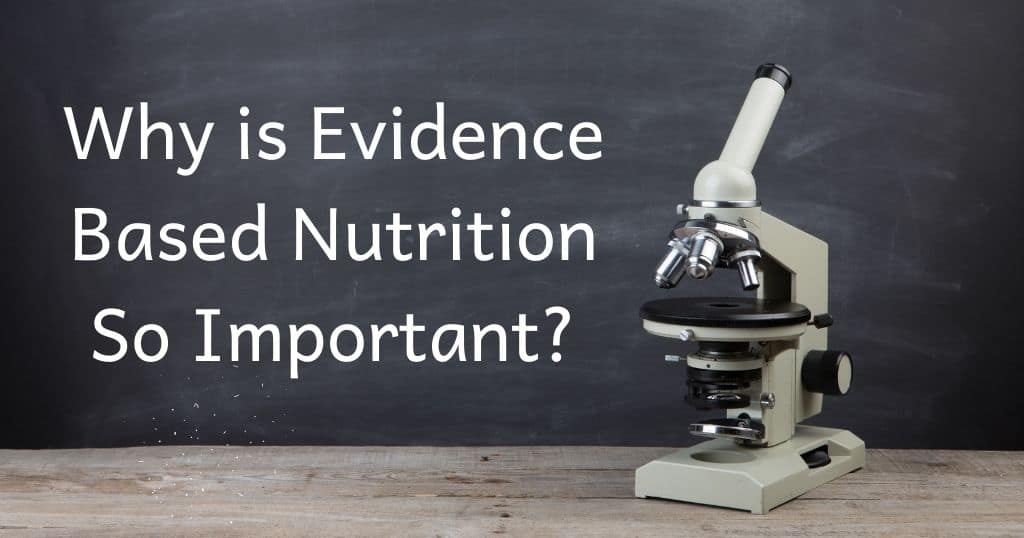Many of you know I am passionate about research and evidence based nutrition. I take extreme care that all of the information I provide is evidence based to protect you and your kidneys!
Why is evidence based nutrition so important and why do I care so much? Here is an overview.
Table of Contents
What is Evidence Based Nutrition?
In a nutshell, evidence based nutrition is nutrition advice that is backed by quality research.
“The practice of evidence-based nutrition involves using the best available nutrition evidence, together with clinical experience, to conscientiously work with patients’ values and preferences to help them prevent, resolve, or cope with (often) problems related to their physical, mental, and social health.”
The Philosophy of Evidence-Based Principles and Practice in Nutrition, Johnson et al. 2019
As a Registered Dietitian, it is my ethical responsibility to provide information and make recommendations that are evidence based.
Facts vs. Opinions
Evidence based nutrition is the difference between fact and opinion. Unfortunately, the internet is saturated with health influencers and even doctors and other dietitians who present their personal opinions as facts. Or, sometimes, their nutrition advice is based on very poor quality or limited research. Neither of these scenarios is the same as evidence based nutrition.
Think of evidence based nutrition as the reason behind nutrition recommendations. If someone makes a claim that “plant based diets are good for you” because they personally feel better on a plant based diet, this is NOT evidence based nutrition.
- What data does this person have to back up this claim?
- Do we know that it is actually the plant based diet that helped this person feel better? Or was it something else?
- Would a plant based diet help people with different health conditions, backgrounds, medications or current eating habits feel better?
- Are there possible harms to a plant based diet?
We don’t know the answer to ANY of these questions because there is no research to support this claim in this scenario. In this situation, the recommendation that “plant based diets are good for you” is an opinion.
On the flip side, if someone says that “plant based diets are beneficial for people with kidney disease” because they have reviewed the multiple studies that have found that plant based diets can slow the progression of kidney disease, this IS evidence based nutrition. The difference is that this statement has quality research to back up it up. This recommendation is evidence based nutrition.

Why Evidence Based Nutrition Matters
Search For Truth
The main reason evidence based nutrition is so important is to make sure recommendations are true. Without research, it is impossible to know if, and how much, a particular food, nutrient or eating pattern is beneficial.
Take our example of the recommendation for plant based diets again. If this recommendation was made simply on the evidence that this person felt better after following a plant based diet, do we really know if it was the plant based diet that made them feel better? Maybe it was a change in seasons, job responsibilities, getting more sleep, or any number of other factors that could make you feel better. Or, they could have felt better on a plant based diet because they happened to be eating more fiber, and it wasn’t necessarily the plant-based nature of the diet that made the difference. Instead, it was just important that this person ate more fiber – animal products had nothing to do with it.
Research studies are designed to weed out all of these potential “confounders”. Researchers carefully design and analyze data to be as sure as possible that the effect (in our example: feeling better) is indeed a direct result of the change (in our example: eating a plant based diet).
One caveat to finding “the truth”. An exciting (and sometimes frustrating!) thing about science is that it is always changing. Researchers are constantly doing more studies and learning more. As a result, evidence based nutrition recommendations change as we learn!
Prevent Harm
Perhaps equally importantly, evidence based nutrition aims to prevent harm. Studies not only help us understand if something is good for us, but also help identify (often unexpected!) side effects.
In our plant based diet example, studies researching people who follow a plant based diet will closely track negative outcomes. For example, perhaps people who follow a plant based diet are more likely to have malnutrition or not eat enough protein. Or, maybe a plant based diet isn’t feasible on a long-term basis in the real world, causing stress and anxiety to people who try to follow it.
The potential harm or “side effects” of an intervention must be identified and weighed against the possible benefits to make evidence based nutrition recommendations.
Not All Evidence Based Nutrition Research Is Created Equal
Yet another nuance to evidence based nutrition is that not all research is the same. Some types of research are MUCH better at getting at the “truth” than others. However, all types of research have their place. In many cases, the “best” research isn’t feasible due to ethical or financial reasons.
Study Design & Levels of Evidence
Study design is one way to evaluate research quality. Different study designs give us different “levels of evidence“. Higher levels of evidence are more important when making evidence based recommendations compared to lower levels of evidence.
In general, case reports give us the lowest level of evidence. Case reports are simply a report on something a doctor or dietitian observed in one person, or a small group of people. Case reports alone should not be used to make evidence based nutrition recommendations.
Randomized controlled trials (RCTs) create the best type of evidence. In this type of study, people are randomized into groups. Randomization helps control for all of those “confounders”. One group receives an intervention (maybe a diet, or a particular food) and the other group does not. Then, researchers measure the difference in an outcome of interest between the groups. Randomized controlled trials are the best way to know if the intervention is the direct cause of the outcome – as well as the cause of negative side effects.

Experts in a field will often take all of the studies that investigated a similar topic, combine them, and publish a study called a meta-analysis. A meta-analysis is a very high level of evidence. Similarly, experts will look at all of the published studies to make evidence based practice guidelines for other medical professionals to use in their practice.
Ideally, evidence based nutrition recommendations are based on formal published guidelines. When guidelines are not available, nutrition professionals must look at all research studies themselves, weigh the quality of the evidence, and come to a conclusion to make evidence based nutrition recommendations.
Human vs. Animal Studies
Unsurprisingly, humans are not the same as other animals! Chemistry and anatomy aren’t necessarily the same in humans and animals. Obviously, animals live very different lives than humans, which make them less than ideal research subjects.
However, animals are often used in research studies when it isn’t ethical or feasible to use humans. It sounds silly to make the distinction between animals and humans. But all too often, nutrition recommendations are based on animal studies alone, without any evidence in humans.
Even worse, nutrition recommendations are sometimes based on studies that were only done with cells. Not even in live animals!
This is not to say that cell and animal studies are not important. They most certainly are! Cell and animal studies are often important first steps to make human recommendations. These types of studies help us determine if a study would be safe or worth doing with humans. Cell studies, in particular, can give us critical information about WHY something is happening, that we would never be able to know from human research alone.
However, nutrition recommendations for humans should never be made from animal or cell studies alone.
Intermediate vs. Clinical Outcomes
Yet another important distinction between research studies is the type of outcome measured. Was the study looking at an actual, clinical outcome? Or, just a proxy for that outcome (aka a “soft” or “intermediate” outcome).
A good example here is urine oxalate levels (intermediate outcome) and kidney stones (clinical outcome). We know that having high urine oxalate makes it more likely that calcium oxalate kidney stones will form. However, foods that impact urine oxalate (intermediate outcome) do not seem to have the same impact on actual kidney stone formation (clinical outcome).
Research studies that measures the clinical outcome (kidney stones) are more important than research that measures the intermediate outcome (high urine oxalate).
How to Find Evidence Based Nutrition Information
Hopefully, I’ve convinced you of the importance of evidence based nutrition recommendations. However, decoding and prioritizing all of these studies yourself is a difficult, if not impossible, task. Thank goodness for healthcare professionals! It is their job to do all of this work for you!
Unfortunately, nutrition advice that is not evidence based is rampant – especially online and on social media. It is up to you to make sure that the nutrition advice you follow is evidence based.
Here are my top tips to help you navigate the murky world of nutrition recommendations.
Look For Published Guidelines
Ideally, you will be able to find formal evidence based guidelines on whatever nutrition topic you are interested in.
The Academy of Nutrition and Dietetics publishes Evidence Based Nutrition Practice Guidelines on many topics including chronic kidney disease (CKD), heart disease, and diabetes.
Many other professional organizations such as the American Heart Association, American Diabetes Association, National Kidney Foundation, and the American Urological Association publish their own evidence based guidelines for both nutrition and medical care.

Check Your Nutrition Information Source
Unfortunately, formal guidelines are not available for many nutrition questions you might have. In this case, it is best to look to the experts. Look into the credentials and background of any person giving out health advice – including anyone you follow on social media or any website you stumble upon after a Google search.
Most websites will have an “About” section that should give you more information about the credibility of the information on the website and it’s authors. If a website does not have this section, or if the author behind the site is not credentialed, I’d be hesitant to take any advice from that site.
Work with a Registered Dietitian Nutritionist
For nutrition health information specifically, a Registered Dietitian Nutritionist (RDN or RD) is the clear way to go. Registered Dietitian Nutritionists are the only healthcare professionals that have any amount of required nutrition education. (Yes, even doctors!) And, RDNs have quite a bit of training!
Registered Dietitian Nutritionists are required to have an undergraduate degree that includes many nutrition and science classes, complete a “dietetic internship” (usually completed in a hospital or healthcare setting), pass a credentialing exam, and maintain continuing education credits. In many states, RDNs also need to be licensed, and meet additional continuing education requirements. Many RDNs also have a graduate degree and/or specialty certifications in a particular practice area, such as kidney nutrition.
RDNs are also held to a professional code of ethics, that includes making evidenced based nutrition recommendations.
Many hospitals and clinics have Registered Dietitian Nutritionists on staff to help support medical care. You can also find RDNs in private practice and online. If you’d like to work with a RDN, ask your doctor for a referral!
Avoid Extreme Recommendations
Extreme nutrition recommendations are a clear way to spot misinformation. Here are some of the most common red flags I see for bad nutrition advice:
- Completely cutting out an entire food group
- “All or nothing” advice
- Demonizing foods (advice to “never” eat a particular food)
- Taking a large amounts of supplements
- Eating only one (or a few) foods – even for just a day
- Consuming only juices or smoothies – even for just a day
- Consuming abnormally large quantities of a particular food or drink
- Completely abstaining from food or drink for a long period of time
If anyone is making these type of recommendations for health reasons, chances are they are not evidence based, and may be harmful. Steer clear!
Evidence Based Nutrition & Beyond
Evidence based practice isn’t just for nutrition – it is just as important for all areas of medical care. Doctors, nurses, therapists, and all other medical professionals should follow evidence based practices.
No matter what kind of medical advice you look for, make sure the advice is evidence based and backed by an expert!
Happy Eating!
Melanie


I think you should add a word or two about the gold standard for a study, namely, a study that is randomized, double(or triple)-blind, and placebo controlled. Triple blind means that neither the participant/patient, nor the monitor/doctor, nor the data gatherer/tabulator know who got what treatment until all the results have been collected and analyzed.
Thank you for your comment! This article could be BOOKS long. I tried to give a very high overview for the general public as much as possible!
simply, Thank you. Your most important post since I’ve been coming here.
Questions about the school.
1. Does it include the cookbooks?
2. Can I add the personalized assistance after purchasing the school?
3. If yes, should I take the school before or after seeing a local RD?
FYI: I’m on Medicare and want to conserve funds as much as possible, so need to give a local RD who accepts my insurance a chance before making a large investment.
Hi Kim! No, the cookbooks are not included. However the school does include example meal plans with many recipes. You can upgrade to VIP membership if you wish after purchasing. If you chose to do this, you would be able to submit your urine test results for feedback, and I would add you to the next 3 group calls from the time you upgraded. I would probably take the school before you meet with a local RD. Unfortunately, kidney stone nutrition is just not in most dietitian’s education, so I would be worried a local RD wouldn’t know how to give you the same direction for stones as you will get from the course. It would be ideal for you to get a good understanding of what you need to do from a stone standpoint – and then that local RD can help you implement it and combine it with other health considerations you might have. I will say that VIP students to Kidney Stone Nutrition School feel confident implementing the changes without additional help from another RD. However, I’m never opposed to people getting extra help!
Wow-that was a LOT to take in! 😳
It certainly is! Evidence-based medicine isn’t necessarily as straightforward as we might think!